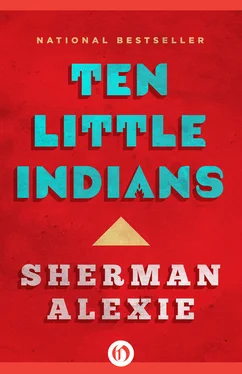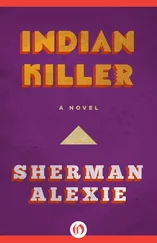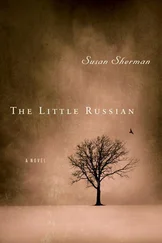“I remember everybody I’ve worked with,” Russell said. “I remember their names, their weights, their goals. I remember the exact day when the quitters quit. I keep a running count of the total weight my clients have lost.”
“What is it?”
“I can’t tell you that. It’s just for me. It’s a sacred number.”
“Okay,” Frank said. “I think it’s good to remember things that way. Very good. I admire that. So, with my admiration clearly expressed, I want you to answer my question. Are you a serious man?”
“If I said this aloud to most of the world, they’d laugh at me,” said Russell. “But I think I have one of the most important jobs in the world. That’s how serious I am about what I do. So yes, in answer to your question, when it comes to this work, I am a very serious man.”
Frank stood and looked out the window at the Seattle skyline. With his back to Russell, he spoke. It was the only way he could say what he needed to say.
“My father died a week ago,” Frank said.
Russell had often heard these grief stories before. He knew five people who’d come directly to the gym from funerals and immediately signed up for full memberships.
“What about your mother?” Russell asked.
“She died when I was eighteen.”
“My mother died of sickle cell last year,” Russell said. “My father was killed when I was twelve. He was a taxi driver. Guy held him up and shot him in the head.”
Frank honored that story — those tragic deaths — with his silence.
“How did your father die?” Russell asked.
“Heart attack.”
Frank and Russell were priests and confessors.
“Listen to me,” Frank said. “I used to be a basketball player, a really good basketball player, the best in the city and maybe the best in the state, and maybe I could have become one of the best in the country. But I haven’t played in a long, long time.”
“What do you need from me?” Russell asked.
Frank turned from the window. “I want to be good again,” he said.
Russell studied the man and his body, visually estimated his fitness levels, and emotionally guessed at his self-discipline and dedication.
“Give me a year,” Russell said.
For the next twelve months, Frank trained five days a week. He lifted free weights, ran miles on the treadmill, climbed hundreds of stories on the stair stepper, jumped boxes until he vomited from the lactic-acid buildup, and climbed ropes until his hands bled. He quit smoking. He measured his food, kept track of all of the calories and the fat, protein, and carbohydrate grams. He drank twelve glasses of water a day. Mr. Death, Frank thought, I am going to drown you before you drown me. Frank’s body-fat percentage, heart rate, and blood pressure all lowered. Every three months, he bought new clothes to fit his new body.
During the course of the year, Frank also cleaned his house. He removed the art from the walls and sold it through want ads and garage sales. Without ceremony, he piled up all of the old blankets and quilts, a few of them over eighty years old, and gave them one by one to the neighbors. He gathered financial records, wills, tax returns, old magazines, photograph albums, and scrapbooks, and stored them in a large safe-deposit box at the bank. After that, he scooped all of the various knickknacks and sentimental souvenirs into cardboard boxes and left them on the corner for others to cart away. One day after the movers carried away all of the old-fashioned and overstuffed furniture, other movers brought in the new, sleek, and simple pieces, so there was only one bed, one dresser, one coffee table, one dining table, one wardrobe, one stove, one refrigerator freezer, and four chairs in the entire house. He pulled up the rugs, hired a local teenager to haul them to the dump, and sanded the hardwood until the floors glowed golden and sepia. Near the end of the year, he found enough courage to give away his father’s clothes and the boxes of his mother’s clothes his father had saved. Frank gave away most of his clothes as well, until he owned only black T-shirts, blue jeans, black socks, black boxers, and black basketball shoes.
Frank kept all of the books, three thousand novels, histories, biographies, and essays, and neatly organized them on bookshelves he built into the walls. He read one book a day. After he disconnected the telephone and permanently stopped the mail, his family and friends worried about him and came to see him, but he turned away all visitors, treating loved ones, strangers, salespeople, religious crusaders, and political activists as if they were all the same.
Frank knew his behavior was obsessive and compulsive, and perhaps he was seriously disturbed, in need of medical care and strong prescriptions, but he didn’t want to stop. He needed to perform this ceremony, to disappear into the ritual, to methodically change into something new and better, into someone stronger.
“Make me hurt,” he said to Russell before every training session.
“All right,” said Russell every few weeks. “I want one thousand sit-ups and one thousand push-ups, and you’re not leaving here until I get them.”
Sometimes Frank overtrained, ran too many miles or lifted too much weight, and injured himself. Russell would chase him out of the gym, tell him to lay off for a week or even two or three, give his body a chance to recover, to heal, but Frank kept pushing, tore muscles and dislocated joints, broke fingers and twisted vertebrae. He stopped training only when he couldn’t get out of bed, and if he found the strength to crawl into a hot shower, he’d warm his muscles enough to lift what he could. At his strongest, he bench-pressed 350 and leg-pressed a thousand pounds. At his weakest, when he was injured, he could lift only paperbacks or pencils, but he’d still do three sets of ten repetitions.
“You can’t keep doing this to yourself,” Russell said to him again and again. “I can’t keep doing this to you. It’s malpractice, man. If you get hurt again, I’m quitting. I’m banning you from the gym forever.”
But Russell never quit on him, and Frank never quit on Russell. Joined, they were not twins or friends; they were not lovers or brothers; they were not teachers or students; they were not mentors or apprentices; they were not monks or sinners. They remained mutable and variable, sacred and profane. Mr. Death, Frank thought, we are your contraries, your opposites and contradictions, your X factors and missing links, your self-canceling saints and self-flagellating monks, your Saint Francis and the other Saint Francis, and we have come to blaspheme your name.
Away from Russell and the gym, Frank played basketball.
Seven days a week, Frank drove the city and searched for games. He traveled from the manicured intramural courts at the University of Washington to the broken-asphalt courts of the Central District; from the violent and verbose games in Green Lake Park to the genial and clumsy games at the YMCA; from the gladiator battles under the I-5 freeway to the hyperorganized leagues at Sound Mind & Body Gym. He played against black men who believed it was their tribal right to dominate the court. He played against white men who wanted to be black men. He played against brown men who hated black and white men. He played against black, brown, and white men who didn’t care about any color other than the green-money bets placed on every point and game. He played against Basketball Democrats who came to the court alone and ran with anybody, and Basketball Republicans who traveled in groups of five and ran only with one another. He played against women who endured endless variations of the same dumb joke: Hey, girl, you can play, but it’s shirts and skins, and you’re running skins. He played against former football players who still wanted to play football, and former wrestlers who wanted only to wrestle. He played against undisciplined young men who couldn’t run a basic pick-and-roll, and against elderly men who never missed their two-handed set shots. He played against trash talkers and polite gentlemen. He played against sociopathic ball hogs, wild gunners, rebound hounds, and assist-happy magicians. He played games to seven, nine, eleven, and twenty-one points. He played winner-keeps-ball and alternate possessions. He played one-on-one, two-on-two, three-on-three, four-on-four, five-on-five, and mob rules, improvisational, every-baller-for-himself, anarchist, free-for-all, death-cage matches. He played against cheaters who constantly changed the score, and honest freaks who called fouls on themselves. He played against liars who bragged about how good they used to be, and dreamers who would never be as good as they wanted to be. He played against Basketball Presbyterians who refused to fast-break, and Basketball Pagans who refused to slow down. He played against the vain Allen-Iverson-wanna-be punks who dribbled between their legs, around their backs, and missed 99 percent of the ridiculous, driving, triple-pump, reverse-scoop shots they hoisted up but talked endless and pornographic trash whenever they happened to make even one shot. He played against the vain Larry-Bird-wanna-be court lawyers who argued every foul call and planted themselves at three-point lines and constantly called for the ball because they were open, damn it, more open than any outsider shooter in the history of the damn game, so pass the freaking rock!
Читать дальше












